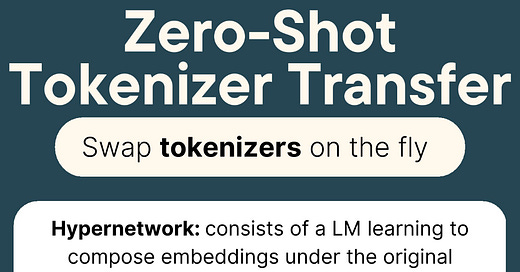A recent LinkedIn post by Marcel Marais, titled "Zero-Shot Tokenizer Transfer Overview", delves into a fascinating development in natural language processing (NLP) and AI technology: zero-shot tokenizer transfer. This concept is pivotal for advancing AI models' capabilities and has significant implications for AI policy makers.
Key Highlights from the Post
Zero-Shot Tokenizer Transfer: This technique allows AI models to generalize and understand new languages or dialects without requiring explicit training data for each new language. It enhances the model’s flexibility and scalability.
Practical Applications: The ability to process and understand multiple languages without additional training can revolutionize how AI systems are deployed across different linguistic contexts, improving accessibility and user experience globally.
Why This Matters for AI Policy
Increased Accessibility and Inclusivity: As AI systems become more capable of understanding diverse languages, policymakers must consider how to leverage this technology to ensure inclusive digital services. This could bridge communication gaps and provide equitable access to AI-powered solutions for non-English speaking populations.
Regulatory Frameworks for Multilingual AI: The deployment of zero-shot tokenizer transfer technology necessitates robust regulatory frameworks to address potential biases, data privacy issues, and the ethical use of AI in various linguistic and cultural contexts.
International Collaboration: The advancement of such technology underscores the importance of international cooperation in AI research and policy-making. By fostering global collaboration, we can ensure that AI systems are developed with a comprehensive understanding of diverse linguistic and cultural needs.
Specific Implications for AI Policy Makers
Language Equity: Ensure that AI policies promote the development and deployment of models that serve a wide array of languages, thus promoting language equity and reducing digital divides.
Ethical Considerations: Establish guidelines to mitigate biases in AI systems, ensuring that they provide fair and unbiased outcomes across different languages and cultural contexts.
Data Privacy: Formulate policies that protect user data, especially when deploying AI systems that process sensitive information across multiple languages and regions.
For an in-depth overview, you can view Marcel Marais’s original LinkedIn post here.
Disclaimer: This content is provided for educational purposes and credits to Marcel Marais for the original post and insights.
More Updates from ISAIL
My AI & Law Book completes 5 years of publication
Hmm, I didn't realise time runs so fast... When I had authored my first book on #artificialintelligence and #internationallaw, the first edition of "Artificial Intelligence Ethics and International Law" was completed by March 2019, first week. After a round of proof-reading, edits and dedication, the first edition of the book was out in public.
📰 New Self-Declaration Rules for F&B Advertisers
The Ministry of Information and Broadcasting (MIB) has issued a new advisory that significantly changes the requirements for self-declaration certificates (SDCs) in advertising. Here’s what you need to know: What's New? 🆕 Limited Scope: The mandatory submission of SDCs is now limited to
Why the Indian Bid to Make GPAI an AI Regulator is Unpreprared
Folks, your beloved Visual Legal Analytica by Indic Pacific Legal Research LLP (vla.digital) has now completed 2 years of its existence! Must say that VLA.Digital has changed the way I wanted to express and discuss legal and policy ideas for everyone's benefit in the
AI Patentability is Messy: Check out the AI and Intellectual Property Training Programme
In the times when using third party #artificialintelligence LLMs is becoming a fad, it is natural to ask some basic questions around what copyright or patent law frameworks may be applied, and in what way. I have addressed AI patentability issues in detail since the early 2020s in our insights at









How does the zero shot tokeniser account for variations in linguistic context and interpretation with the underlying training data?